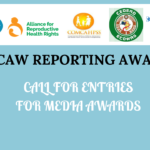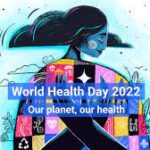A growing number of people worldwide are failing to recognize the devasting effects of environmental crisis on health, particularly, the disproportionate impact on women and girls, as well as other vulnerable populations who lack the resources to protect themselves or adapt to the changes.
According to a WHO report, climate change has the potential to exacerbate existing health inequalities between and within populations, further threatening the attainment of universal health coverage (UHC) in a variety of ways, including intensifying the existing burden of diseases and worsening existing barriers to accessing health services.
With existing research showing that women and adolescent girls are disadvantaged in their access to health services, particularly SRH, due to structural and systemic barriers, these vulnerable populations are, most likely to bear the brunt of environmental crises on health.
The global climate emergencies, coupled with the prevailing COVID-19 pandemic, if not properly managed, could have disastrous consequences on not just the health of individuals but countries’ health systems as well, particularly, low and middle-income countries. This could also potentially derail the progress made toward health system strengthening and eliminating health inequities.
Interview with an environmentalist towards World Health Day
In commemoration of this year’s World Health Day, ARHR interviewed Chibeze Ezekiel, a climate change activist and 2020 Goldman Environmental Prize Recipient for Africa, for his expert opinion on the relationship between environmental crises and health, how they interact, and how we can best collaborate to ensure a healthy sustainable environment for improved health outcomes.
Ezekiel, in the interview, remarked that this year’s World Health Day provides an opportunity to remind the public about the importance of understanding the impact of climate change on their health and well-being.
He asserted that the occasion also presents the platform for duty bearers to reaffirm their commitments to providing good health care to citizens through strengthened primary health care towards the realization of health for all; where no one is left behind.
Drawing on a study from WHO, Ezekiel stated that the theme for this year’s World Health Day, Our Planet, Our Health, is a strong signal that the situation of our planet has a significant impact on our health.
“A WHO research suggests that diseases such as malaria, cholera, asthma, diarrhea, and heat stress are on the rise as a result of pollution of the planet,” he said.
Additional statistics provided by WHO indicate that nearly all of the world’s population (99%) breathes air that exceeds WHO air quality criteria. This includes inhaling hazardous levels of small particulate matter and nitrogen dioxide, with those in low and middle-income nations being the most exposed.
WHO further estimates that more than 13 million people die each year due to preventable environmental causes around the world.
Way Forward
Speaking on actions needed to accelerate efforts at attaining a healthy sustainable environment for better health outcomes and well-being, Ezekiel reckons that achieving this goal will require a sector-wide approach.
“This year’s World Health Day should spark a collaborative effort between environmentalists and health crusaders to not only raise awareness about the looming danger but also to encourage good practices by all parties (including citizens and duty bearers) to achieve the common goal,” he stated.
Ezekiel believes that this can be accomplished by:
- creating a space for periodic dialogues between environmentalists, health crusaders, and citizens on the interrelationship between the planet and human health;
- inculcating environmental issues in health advocacy;
- building the capacity of health practitioners and advocates on relevant environmental issues; and
- intensifying awareness of the role of the environment on health and people’s well-being.
About Our Resource Person
Chibeze Ezekiel is a strong climate activist and Coordinator for the Strategic Youth Network for Development (SYND), a youth-led NGO that promotes youth inclusion in the governance of the Natural Resources & Environmental (NRE) sector.
He serves on the board of 350.org and is a member of the International Experts of the Environment of Peace 2022 (EP2022) project. He chairs the Youth in Natural Resources and Environmental Governance (Youth-NREG) Platform.
As a strong climate activist, he holds the conviction that young people must be at the heart of climate solutions in that young people have a pivotal role to play in winning the fight against climate change.



